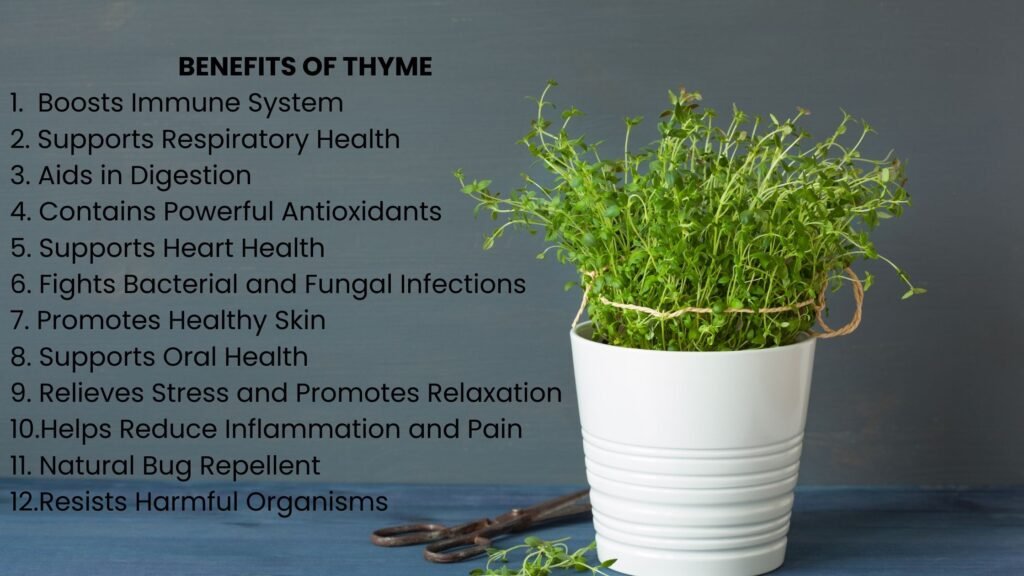Introduction
Thyme is a well-known herb used in kitchens around the world, adding a fragrant and earthy flavor to various dishes. However, beyond its culinary uses, thyme has long been valued in traditional medicine for its powerful healing properties. This small but mighty herb has been used for centuries in ancient Greek, Roman, and Egyptian cultures as a natural remedy for a variety of health concerns.
Rich in essential oils, antioxidants, and vitamins, thyme is packed with compounds that support the immune system, improve digestion, and promote overall well-being. Whether consumed as a tea, used in essential oil form, or added to meals, thyme offers numerous health benefits that make it a must-have in any natural healing routine.
In this article, we’ll explore 10 healing benefits of thyme and how this versatile herb can enhance your health and wellness. Whether you’re looking for a natural way to boost immunity, improve respiratory health, or support digestion, thyme may be the herbal remedy you’ve been searching for. Let’s dive into the many ways this simple herb can contribute to your well-being!
What is Thyme?
Thymus vulgaris, commonly known as thyme, is a versatile herb used in both cooking and natural medicine. Garden thyme is a popular culinary herb known for its intense flavor and aroma. Lemon thyme, another variety, is also utilized in cooking for its distinct characteristics. The thyme herb is also known for its extraction process for thyme oil, which is used in various health and culinary applications. Belonging to the mint family (Lamiaceae), thyme has a distinct earthy and slightly minty flavor, making it a favorite ingredient in various dishes. Beyond its culinary uses, thyme has been valued for centuries for its medicinal properties, often used in herbal remedies to support overall health.
This powerful herb is packed with antioxidants, vitamins, and essential oils, making it a natural remedy for many health concerns. It contains vitamin C, vitamin A, iron, calcium, and thymol, a potent compound with antimicrobial and anti-inflammatory properties. These nutrients contribute to thyme’s ability to strengthen the immune system, fight infections, and support digestion.
Thyme is available in several forms, each offering unique benefits:
Fresh thyme – Used in cooking for its strong aroma and flavor.
Dried thyme – Convenient for seasoning food and making herbal infusions.
Thyme essential oil – Commonly used in aromatherapy and as a natural disinfectant.
Thyme tea – A soothing herbal tea known for its respiratory and digestive benefits.
Thyme supplements – Found in capsule or tincture form for concentrated health benefits.
Whether used as a spice, brewed as a tea, or applied as an essential oil, thyme offers numerous health benefits, making it a valuable addition to any wellness routine.
History of Thyme
Thyme has a rich and fascinating history that dates back thousands of years, with records of its use in ancient Egypt, Greece, and Rome. This fragrant herb has been prized not only for its culinary uses but also for its medicinal and symbolic significance across different cultures.
Ancient Egypt – Egyptians used thyme as part of the mummification process, recognizing its powerful antibacterial and preservative properties.
Ancient Rome – Romans believed thyme symbolized courage and strength. Soldiers were given thyme before battles to boost their bravery, and it was also used to purify homes and temples. They even ate thyme before meals to aid digestion.
Greek Influence – The word “thyme” comes from the Greek word thymos, meaning courage. The Greeks used thyme in temples as incense and added it to baths for its invigorating effects.
Medieval England – Thyme became a staple cooking spice in medieval kitchens. It was also used as a remedy for respiratory ailments and infections, often included in herbal medicine preparations.
Over time, thyme’s reputation as a powerful healing herb has remained strong. From its use in ancient rituals and medicine to modern-day applications in aromatherapy and wellness, thyme continues to be valued for its wide range of health benefits.
Nutrients in Thyme
Thyme is packed with essential nutrients and powerful compounds that contribute to its numerous health benefits. This versatile herb is more than just a flavorful ingredient—it is a nutrient-dense powerhouse that supports overall well-being.
Key Nutrients Found in Thyme:
Vitamins – Thyme is rich in vitamin A, B6, and C, which are essential for immune support, skin health, and brain function.
Minerals – It provides calcium, iron, manganese, and fiber, which contribute to bone health, digestion, and overall bodily functions.
Phenolic Compounds – Thyme contains thymol, eugenol, and carvacrol, known for their antibacterial, antifungal, and anti-inflammatory properties.
Antioxidants – This herb is a great source of apigenin, luteolin, saponins, and tannins, which help combat oxidative stress and protect cells from damage.
Flavonoids – Thyme contains luteolin-7-O-glucoside, apigenin, quercetin, and kaempferol, powerful antioxidants and anti-inflammatory agents that support heart health, immune function, and overall wellness.
With its rich nutritional profile, thyme serves as a natural remedy for various health concerns while also enhancing the flavor and nutritional value of meals.
Health Benefits of Thyme

1. Boosts Immune System
Thyme is a natural immune booster, thanks to its high concentration of vitamin C, antioxidants, and essential compounds that help the body fight off infections and illnesses.
Rich in Vitamin C – Thyme provides a significant amount of vitamin C, which plays a crucial role in strengthening the immune system and helping the body fight infections more effectively.
Loaded with Antioxidants – The antioxidants in thyme, including flavonoids and polyphenols, neutralize harmful free radicals that can weaken the immune system and contribute to chronic diseases.
Supports the Body’s Natural Defense System – Thyme’s antimicrobial and antibacterial properties help the body ward off colds, flu, and respiratory infections, making it an excellent herb for immune support.
By including thyme in your diet—whether as a tea, supplement, or seasoning in meals—you can enhance your immune defenses and promote overall health naturally.
2. Supports Respiratory Health
Thyme is a powerful natural remedy for coughs, colds, and respiratory congestion, making it an excellent herb for promoting lung and respiratory health.
Relieves Coughs and Congestion – Thyme contains thymol, a natural compound with antimicrobial and expectorant properties that helps clear mucus and open airways, making it easier to breathe.
Eases Cold Symptoms – The antibacterial and antiviral effects of thyme help fight respiratory infections, reducing symptoms like sore throat, sinus congestion, and bronchial irritation.
Thyme Tea for Soothing Relief – Drinking warm thyme tea can loosen phlegm, soothe throat irritation, and provide relief from persistent coughs.
Thyme Essential Oil for Steam Therapy – Inhaling thyme essential oil steam can help clear nasal passages, reduce inflammation, and improve breathing for those suffering from allergies, asthma, or respiratory infections.
By incorporating thyme tea, essential oil, or fresh thyme into your diet, you can naturally support lung health and combat respiratory issues with this powerful healing herb.
3. Aids in Digestion
Thyme is a natural digestive aid that helps maintain gut health and supports smooth digestion.
Reduces Bloating and Gas – Thyme contains carminative properties, which help relieve bloating, gas, and stomach discomfort by relaxing the digestive tract.
Eases Indigestion – The natural antispasmodic effects of thyme can help soothe an upset stomach, reducing cramps and indigestion.
Promotes Gut Health – Thyme is rich in antimicrobial compounds, which help balance gut bacteria, preventing the overgrowth of harmful microbes that can lead to digestive issues.
Supports a Healthy Microbiome – The phenolic compounds in thyme, such as thymol and carvacrol, support a healthy gut environment by fighting off harmful bacteria while promoting the growth of beneficial probiotics.
Improves Nutrient Absorption – By stimulating digestive enzymes, thyme helps the body break down food more efficiently, improving nutrient absorption and overall digestion.
Drinking thyme tea after meals or adding fresh thyme to your dishes can naturally support digestion and keep your gut happy and healthy.
4. Contains Powerful Antioxidants
Thyme is packed with antioxidants, which help protect the body from free radical damage and promote overall health.
Rich in Antioxidant Compounds – Thyme contains powerful flavonoids like apigenin, luteolin, quercetin, and kaempferol, which help combat oxidative stress and reduce cell damage.
Supports Cellular Health – The antioxidants in thyme help protect cells from premature aging and deterioration caused by environmental stressors, pollution, and toxins.
Boosts Immune Function – By reducing oxidative stress, thyme strengthens the immune system, helping the body defend itself against infections and diseases.
Promotes Heart Health – The antioxidant properties of thyme help reduce inflammation, lower bad cholesterol (LDL), and support healthy blood circulation, reducing the risk of heart-related conditions.
Protects Against Chronic Diseases – Antioxidants play a vital role in reducing inflammation, which is linked to various chronic diseases like heart disease, diabetes, and neurodegenerative disorders.
Incorporating thyme into your meals or drinking thyme tea regularly is a simple way to enhance your antioxidant intake and protect your body from harmful free radicals.
5. Supports Heart Health
Thyme is a heart-friendly herb that can help support cardiovascular health in multiple ways.
Helps Lower Blood Pressure – Compounds in thyme, such as rosmarinic acid and thymol, have been shown to help relax blood vessels and improve circulation, which may contribute to maintaining healthy blood pressure levels.
Improves Circulation – Thyme contains iron and other essential minerals that help improve blood flow and support oxygen transport throughout the body.
Reduces Bad Cholesterol (LDL) – Studies suggest that thyme can help lower LDL cholesterol levels while maintaining or even increasing good cholesterol (HDL), which is crucial for heart health.
Prevents Oxidative Stress – The antioxidants in thyme help protect the heart and blood vessels from damage, reducing the risk of cardiovascular diseases.
Anti-Inflammatory Properties – Chronic inflammation is a major contributor to heart disease, and thyme’s natural anti-inflammatory compounds may help reduce inflammation in the arteries and improve overall heart function.
By adding thyme to your diet, whether through seasoning, teas, or essential oil use, you can help support a healthy heart and circulatory system naturally.
6. Fights Bacterial and Fungal Infections
Thyme is a natural antimicrobial agent with powerful bacteria-fighting and antifungal properties, making it a great remedy for infections.
Antimicrobial Properties – Thyme contains thymol, a potent compound known for its ability to kill harmful bacteria and prevent infections. It is often used in natural disinfectants, mouthwashes, and cleaning products.
Fights Fungal Infections – Thyme’s antifungal properties help combat common fungal infections like athlete’s foot, toenail fungus, and candida overgrowth.
Treats Skin Infections – The antibacterial nature of thyme makes it useful for treating minor cuts, wounds, and acne by preventing bacterial growth and promoting faster healing.
Supports Oral Health – Thyme is commonly used in mouthwashes and toothpaste to fight bacteria responsible for bad breath, gum disease, and cavities.
Helps with Respiratory Infections – Thyme essential oil is often used in aromatherapy or steam inhalation to help clear bacterial infections in the throat and lungs, easing conditions like bronchitis and sore throats.
Whether used topically, in essential oil form, or as a tea, thyme provides natural protection against harmful bacteria and fungi, making it a valuable herbal remedy for infections.
7. Promotes Healthy Skin
Thyme is a natural remedy for skin health, offering antibacterial, anti-inflammatory, and antioxidant benefits that help clear acne, reduce irritation, and improve overall skin texture.
Fights Acne – Thyme has antibacterial properties that help combat acne-causing bacteria, making it a great natural alternative to harsh chemical treatments. It can be used as a facial toner, spot treatment, or infused in skincare products.
Soothes Skin Inflammation – The anti-inflammatory compounds in thyme help calm redness, swelling, and irritation caused by conditions like eczema, psoriasis, and rashes.
Rich in Antioxidants – Thyme contains flavonoids and phenols that protect skin from free radical damage, slowing signs of aging and promoting a healthy glow.
Helps Heal Wounds – Due to its antiseptic and healing properties, thyme can speed up the healing of minor cuts, burns, and insect bites.
DIY Skincare Uses – Thyme can be used in homemade face masks, toners, and steam treatments to help cleanse and purify the skin. Thyme-infused oil can also be used as a natural moisturizer.
Incorporating thyme into your skincare routine—whether through essential oils, herbal infusions, or DIY treatments—can help maintain clear, healthy, and radiant skin naturally.
8. Supports Oral Health
Thyme, especially thyme essential oils, is a powerful natural remedy for oral hygiene, thanks to its antibacterial and antimicrobial properties that help maintain fresh breath, healthy gums, and strong teeth.
Fights Bad Breath – The antibacterial compounds in thyme, especially thymol, help eliminate odor-causing bacteria, making it an effective natural breath freshener.
Prevents Gum Disease – Thyme’s anti-inflammatory properties can help reduce gum swelling, redness, and bleeding, preventing conditions like gingivitis and periodontitis.
Supports Cavity Prevention – The antimicrobial agents in thyme fight harmful bacteria in the mouth, reducing plaque buildup and tooth decay.
Natural Ingredient in Mouthwashes & Toothpaste – Many natural mouthwashes and toothpaste include thyme extracts or thymol, which helps disinfect the mouth and promote oral health.
DIY Oral Care Uses – You can make a homemade mouth rinse by steeping thyme leaves in water or using thyme essential oil diluted in water for a natural antibacterial mouthwash.
Incorporating thyme into your oral care routine can help freshen breath, protect teeth, and support gum health naturally.
9. Relieves Stress and Promotes Relaxation
Thyme is not just beneficial for physical health—it also plays a role in reducing stress and improving mood. Its natural compounds, particularly carvacrol, have been shown to positively impact brain activity and help promote a sense of calm and well-being.
Reduces Anxiety and Stress – Thyme’s aromatic compounds help reduce cortisol levels, the stress hormone, making it an effective natural stress reliever.
Enhances Mood – The carvacrol in thyme has been linked to increased dopamine and serotonin production, which are neurotransmitters responsible for happiness and relaxation.
Supports Better Sleep – Thyme’s relaxing properties help calm the nervous system, making it beneficial for those struggling with insomnia or restless sleep.
Aromatherapy Benefits – Thyme essential oil is commonly used in aromatherapy to promote relaxation and mental clarity. Diffusing thyme oil or adding a few drops to a warm bath can help ease tension and uplift the mind.
DIY Relaxation Methods – Try inhaling thyme essential oil, adding it to massage oils, or drinking thyme tea to enjoy its calming effects.
Incorporating thyme into your daily routine can help reduce stress, enhance mood, and promote relaxation naturally.
10. Helps Reduce Inflammation and Pain
Thyme is a natural anti-inflammatory agent that can help reduce pain and swelling in the body. Its active compounds, such as thymol and carvacrol, have been shown to combat inflammation, making it a great option for those dealing with chronic pain conditions.
Relieves Arthritis and Joint Pain – Thyme’s anti-inflammatory properties can help ease stiffness, swelling, and pain associated with arthritis and other joint issues.
Soothes Sore Muscles – Applying thyme-infused oil or a warm thyme compress can help relieve muscle tension and soreness after a workout or long day.
Alleviates Headaches – Thyme’s calming effects may also help reduce headaches and migraines when used in aromatherapy or massage.
Supports Natural Pain Relief – Drinking thyme tea or using thyme essential oil in massage therapy can provide natural relief from aches and pains.
Reduces Menstrual Cramps – Thyme has been traditionally used to ease menstrual pain by relaxing muscles and reducing uterine contractions.
Whether applied topically, consumed as tea, or used in aromatherapy, thyme offers a natural, effective way to reduce inflammation and pain without relying on synthetic painkillers.
11. Natural Bug Repellent
Thyme is not just a culinary delight; it also serves as a natural bug repellent, making it a must-have in your home. The essential oils in thyme, particularly thymol and carvacrol, are known for their insect-repelling properties. These compounds can help keep mosquitoes and other pests at bay, providing a natural alternative to chemical repellents.
To use thyme essential oil as a bug repellent, you can add a few drops to a diffuser to keep insects away from your living spaces. For a more direct approach, mix thyme essential oil with a carrier oil, such as coconut or jojoba oil, and apply it to your skin or clothing. This method not only repels bugs but also leaves a pleasant, earthy aroma.
For an even more potent bug spray, combine thyme essential oil with other natural repellents like citronella and lemongrass. This combination creates a powerful and effective bug spray that can be used both indoors and outdoors. Whether you’re enjoying a summer evening on the patio or going for a hike, thyme can help keep those pesky bugs at bay.
12. Resists Harmful Organisms
Thyme is a powerhouse when it comes to resisting harmful organisms, making it an invaluable addition to your health and wellness routine. The essential oils in thyme, particularly thymol and carvacrol, are renowned for their potent antimicrobial properties, which can combat a wide range of microorganisms.
Research has shown that thyme essential oil is effective against various bacteria, including E. coli, Staphylococcus aureus, and Pseudomonas aeruginosa. These bacteria are often responsible for common infections and can be challenging to manage with conventional treatments. Additionally, thyme oil has demonstrated efficacy in inhibiting the growth of fungi, such as Candida albicans, which can cause numerous health issues, including yeast infections and thrush.
The antimicrobial properties of thyme make it a popular ingredient in natural remedies for various health concerns. For instance, thyme essential oil can be used topically to treat skin infections, added to bath water for a soothing soak, or inhaled to help clear respiratory infections. Its antiviral and antifungal properties further enhance its ability to fight off a range of harmful organisms.
Here are some key benefits of thyme’s ability to resist harmful organisms:
Reduced Risk of Infection: Thyme’s antimicrobial properties help lower the risk of infections, making it a valuable addition to your health regimen.
Improved Digestive Health: By reducing the growth of harmful bacteria in the gut, thyme can help alleviate digestive issues such as bloating and gas.
Soothing Skin Conditions: Thyme’s antifungal and antibacterial properties can help soothe skin conditions like acne and eczema by reducing inflammation and combating infection.
Boosted Immune System: The antimicrobial properties of thyme can help strengthen the immune system, making it easier to fend off illnesses and infections.
Incorporating thyme essential oil into your daily routine can provide a natural defense against harmful organisms. Whether you use it topically, add it to your bath, or inhale it, thyme oil can help keep you healthy and well.
How to Use Thyme for Healing
Thyme is a versatile herb that can be easily incorporated into your daily routine to support overall health. Whether used in cooking, as tea, in essential oil form, or as a supplement, thyme provides numerous healing benefits.
1. Thyme Tea
How to Prepare: Steep 1-2 teaspoons of dried thyme in hot water for 10 minutes. Strain and enjoy.
Benefits: Helps with digestion, respiratory health, and immune support.
Best Time to Drink: After meals for digestion or before bed to relax.
2. Cooking with Thyme
How to Use: Add fresh or dried thyme to soups, stews, roasted vegetables, and marinades.
Benefits: Supports heart health, digestion, and inflammation reduction while enhancing flavor.
3. Thyme Essential Oil
Aromatherapy: Add a few drops of thyme essential oil to a diffuser to reduce stress and improve respiratory health.
Topical Use: Mix a few drops with a carrier oil (coconut or olive oil) and apply to the skin for pain relief, skin conditions, or massage therapy.
Mouthwash: Add a drop of thyme oil to warm water for a natural antibacterial rinse.
4. Thyme Supplements
Capsules or Extracts: Available in health stores for immune support and inflammation reduction.
Dosage: Follow recommended guidelines on the product label.
5. Home Remedies with Thyme
For Cough & Cold Relief: Inhale steam from thyme-infused hot water or drink thyme tea.
For Skin Health: Apply thyme-infused oil to acne-prone skin.
For Muscle Pain: Add thyme essential oil to a warm bath or massage sore areas.
By incorporating thyme into your diet, skincare, and wellness routine, you can experience its powerful healing benefits naturally.
6. Using Thyme Oil in Aromatherapy
Thyme essential oil is a versatile addition to your aromatherapy toolkit, offering numerous benefits for relaxation and mood enhancement. The aromatic compounds in thyme oil can help reduce stress, promote relaxation, and improve overall mood, making it a valuable tool for mental well-being.
To use thyme oil in aromatherapy, you can inhale it directly from a cloth or handkerchief for an immediate calming effect. Alternatively, add a few drops to a diffuser to fill your space with its soothing aroma. For a more personalized experience, mix thyme oil with other essential oils like lavender or eucalyptus to create a custom blend that suits your needs.
Thyme oil is also beneficial in massage therapy. When diluted with a carrier oil, such as coconut or jojoba oil, it can be used to ease muscle tension and promote relaxation. The anti-inflammatory properties of thyme oil make it particularly effective for relieving sore muscles and joint pain.
Remember, thyme essential oil is potent, so always dilute it with a carrier oil before applying it to the skin to avoid irritation. By incorporating thyme oil into your aromatherapy routine, you can enjoy its calming and uplifting effects naturally.
Additional Tips for Maximizing Thyme’s Benefits
To get the most out of thyme’s healing properties, it’s essential to store it properly and choose high-quality products. Here are some tips to ensure long-lasting freshness and effectiveness:
1. Best Ways to Store and Preserve Thyme
Fresh Thyme: Store in the refrigerator, wrapped in a damp paper towel and placed in an airtight container or plastic bag. It stays fresh for 1-2 weeks.
Dried Thyme: Keep in a cool, dark place in an airtight jar. It can retain its potency for up to 6 months.
Freezing Thyme: Freeze whole sprigs in ice cube trays with water or oil. This method preserves freshness for several months.
Thyme Oil or Infused Oil: Store in a dark glass bottle away from heat and sunlight to maintain its medicinal properties.
2. Choosing High-Quality Thyme Products
Fresh vs. Dried: Fresh thyme has higher essential oil content and stronger flavor, while dried thyme is more convenient for long-term use.
Organic Thyme: Choose organic thyme to avoid pesticides and chemicals.
Thyme Essential Oil: Look for 100% pure, therapeutic-grade thyme oil with no added synthetic ingredients.
Thyme Supplements: If taking capsules or extracts, opt for brands that use high-quality, sustainably sourced thyme.
By selecting the best thyme products and storing them properly, you can maximize their healing benefits and enjoy thyme as a natural remedy for overall wellness.
3. Food Safety and Preservation
Thyme has been a trusted ally in food preservation for centuries, thanks to its powerful antimicrobial properties. The essential oils in thyme, particularly thymol and carvacrol, are effective in preventing the growth of bacteria, yeast, and mold, making it an excellent natural preservative.
You can use thyme to preserve a variety of foods, including meat, fish, and vegetables. Simply add fresh thyme or thyme essential oil to your marinades and brines to extend the shelf life of your perishables. This not only helps prevent spoilage but also infuses your food with a delightful, earthy flavor.
In addition to preserving food, thyme can be used to make natural cleaning products for your kitchen. Create a simple disinfectant spray by combining thyme essential oil with water and vinegar. This mixture can be used to clean countertops, cutting boards, and other surfaces, ensuring a hygienic cooking environment.
For a comprehensive preservation approach, combine thyme with other herbs and spices like rosemary, sage, and oregano. This blend can be used to create a natural preservative mix that enhances the flavor and longevity of your food. By incorporating thyme into your food safety practices, you can enjoy fresh, flavorful meals while reducing waste naturally.
Precautions and Contraindications
While thyme is generally safe, there are a few considerations to keep in mind to ensure safe use:
Possible Allergic Reactions: Though rare, some individuals may experience allergic reactions to thyme, especially if they have existing allergies to mint (as thyme belongs to the mint family).
Safe for Topical and Dietary Use: Both fresh thyme and thyme essential oil are considered safe for consumption and topical application, but essential oils should always be diluted before applying to the skin.
Pregnant or Breastfeeding Women: While thyme is commonly used in cooking, thyme essential oil should be used with caution during pregnancy or breastfeeding. Consulting a healthcare professional is advised.
Medication Interactions: Those on blood-thinning medications should use thyme carefully, as it may have mild anticoagulant effects.
Essential Oil Safety: Thyme essential oil is potent and should never be ingested without medical supervision.
By following these precautions, you can safely enjoy the many health benefits of thyme while minimizing potential risks.
Conclusion
Thyme is more than just a fragrant herb used in cooking—it is a powerful natural remedy with a wide range of health benefits. From boosting the immune system and supporting respiratory health to improving digestion and promoting heart health, thyme offers numerous healing properties. Its antioxidant, antimicrobial, and anti-inflammatory effects make it an excellent addition to your daily wellness routine.
Incorporating thyme into your lifestyle is easy—whether through tea, essential oils, supplements, or fresh herbs in cooking. By making thyme a regular part of your diet and self-care practices, you can naturally enhance your overall well-being.
Ready to experience the benefits of thyme? Try adding thyme-based products and home remedies to your routine today and unlock its healing potential!




